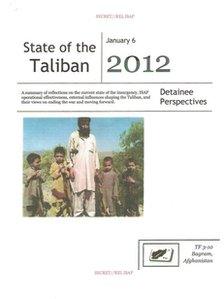Pakistan helping Afghan Taliban - Nato
- Published

The report comes at a sensitive time in Pakistan-Nato relations
The Taliban in Afghanistan are being directly assisted by Pakistani security services, according to a secret Nato report seen by the BBC.
The leaked report, derived from thousands of interrogations, claims the Taliban remain defiant and have wide support among the Afghan people.
A BBC correspondent says the report is painful reading for international forces and the Afghan government.
A Pakistani foreign ministry spokesman called the accusations "ridiculous".
"We are committed to non-interference in Afghanistan and expect all other states to strictly adhere to this principle," Abdul Basit told the BBC.
"A stable and peaceful Afghanistan is in our own interests. We cannot indulge in any activity which takes us away from achieving that objective," he added.
The report alleges that Pakistan knows the locations of senior Taliban leaders.
"We have long been concerned about ties between elements of the ISI [Pakistan's intelligence service] and some extremist networks," said US Pentagon spokesman Captain John Kirby, adding that the US Defence Department had not yet seen the report.
Pakistan Foreign Minister Hina Rabbani Khar is currently in Kabul for talks with Afghan President Hamid Karzai.
'Informational'
The BBC's Quentin Sommerville in Kabul says the report - on the state of the Taliban - fully exposes for the first time the relationship between the ISI and the Taliban.
The report is based on material from 27,000 interrogations with more than 4,000 captured Taliban, al-Qaeda and other foreign fighters and civilians.
It notes: "Pakistan's manipulation of the Taliban senior leadership continues unabatedly".
It says that Pakistan is aware of the locations of senior Taliban leaders.
"Senior Taliban representatives, such as Nasiruddin Haqqani, maintain residences in the immediate vicinity of ISI headquarters in Islamabad," it said.
It quotes a senior al-Qaeda detainee as saying: "Pakistan knows everything. They control everything. I can't [expletive] on a tree in Kunar without them watching."
"The Taliban are not Islam. The Taliban are Islamabad."
Our correspondent says the report seems to suggest that the Taliban feel trapped by ISI control and fear they will never escape its influence.
However, it states: "As this document is derived directly from insurgents it should be considered informational and not necessarily analytical."
Adm Mike Mullen, former chairman of the US Joint Chiefs of Staff, has explained Pakistan's closeness to the Afghan Taliban by pointing to infiltration of its army by the religious right, but he also says it is part of a grand strategy to increase leverage in the region via "proxies".
Despite Nato's strategy to secure the country with Afghan forces, the secret document details widespread collaboration between the insurgents and Afghan police and military.
Lt Col Jimmie Cummings, a spokesman for Nato's International Security Assistance Force (Isaf) in Afghanistan, said the document was "a classified internal document that is not meant to be released to the public".
"It is a matter of policy that documents that are classified are not discussed under any circumstances," he said.
The report also depicts the depth of continuing support among the Afghan population for the Taliban, our correspondent says.
It paints a picture of al-Qaeda's influence diminishing but the Taliban's influence increasing, he adds.
Gen. Jack Keane, former US Army vice chief of staff: "They provide resources, sanctuary... and training"
Taliban influence
In a damning conclusion, the document says that in the last year there has been unprecedented interest, even from members of the Afghan government, in joining the Taliban cause.
It adds: "Afghan civilians frequently prefer Taliban governance over the Afghan government, usually as a result of government corruption."
The report has evidence that the Taliban are purposely hastening Nato's withdrawal by deliberately reducing their attacks in some areas and then initiating a comprehensive hearts-and-minds campaign.
It says that in areas where Isaf has withdrawn, Taliban influence has increased, often with little or no resistance from government security forces. And in many cases, with the active help of the Afghan police and army.
When foreign soldiers leave, Afghan security forces are expected to take control.
The report says that surrender is far from their collective mindset.
"For the moment, they believe that continuing the fight and expanding Taliban governance are their only viable courses of action," it adds.
According to the report, rifles, pistols and heavy weapons have been sold by Afghan security forces in bazaars in Pakistan.
The report adds that Taliban members "do not receive salaries or other financial incentives for their work", but their operations are funded by the narcotics trade and they frequently take a cut from the trade.
Their main revenue, though, is from donations, and they travel around the country from door to door making no secret of their affliation, it says.
Follow BBC Kabul correspondent Quentin Sommerville on Twitter @mrsommerville, external